A note: This essay was written and edited as events unfolded on election night. If parts feel structurally chaotic or thematically scattered, it's because they are - trying to form coherent thoughts while watching liberal democracy at its knees, as it turns out, is not great for clean narrative arcs.
It's 4am in London and I'm doing what I always do when politically terrified - watching Veep. My laptop screen shows Julia Louis-Dreyfus frozen mid-rant as Selina Meyer demands a recount in Nevada. Meanwhile, my phone keeps lighting up with real-time updates from Pennsylvania that could determine everything. U.S. votes are still being counted in what feels like slow motion towards inevitability. I've lost track of how many times I've refreshed both. My fourth cup of tea's gone cold. Outside, London inches toward dawn while America's Tuesday refuses to end. The gap between fiction and reality narrows with every update.
In the episode playing, Selina's team is spread across a Las Vegas campaign office, surrounded by pizza boxes and electoral maps, performing what the show presented as peak political chaos in 2016. The irony lands like a brick through a window: what Veep played as satire, we've turned into routine. I know exactly which snacks to buy for an election night vigil. Which news sites refresh fastest. How to pace my doomscrolling to last until dawn. Group chats pulse with nervous energy across time zones. My friends from three continents send memes about stress-eating, about sleep deprivation, about the surreal act of having to attend Zoom meetings while history hangs in the balance. The ocean between me and Nevada doesn't make the refresh button any less tempting.
The episode continues its parade of crisis management – Amy stress-vomiting into a trash can, Dan trading ethical compromises like Pokemon cards, Mike accidentally telling the truth to reporters. But watching it now feels less like comedy and more like a quaint instructional video. We've developed better systems, more sophisticated coping mechanisms. We've learned to monetize our anxiety through merchandise and memes. We've professionalized what these characters barely manage to go through.
When Selina finally snaps – "Democracy is just gonna have to wait, okay?" – it strikes a different chord than it did eight years ago. Not because the line has aged poorly, but because it's aged too well. We're no longer shocked by the casual dismissal of democratic norms. We've built content strategies around it.
I refresh my phone again. Still nothing. The number stays static, but something else has shifted: the realization that I'm not just watching a show about political crisis management. I'm performing my own version of it, complete with the same nervous tics and darkly comic asides. This feels less like performance art and more like another Tuesday in America, where satire taps out and reality takes the wheel.
Character Evolution as Mirror
While America counts, London inches toward Wednesday. The city outside my window will soon wake up to another day of routines - tube strikes, coffee runs, work meetings - while carrying the weight of uncounted ballots like a shared secret. Each mundane act tomorrow will feel like a scene from another show entirely, one where the world isn't refresh-button-adjacent. But perhaps that's why watching Amy Brookheimer tonight feels so startlingly familiar.
Amy Brookheimer, hair disheveled, mascara-stained, screaming about "that unstable, death-obsessed, authoritarian psychopath" while quitting her job. Back then, it was shocking enough to earn an Emmy nomination. Tonight, as Trump secures his return to power and "retribution" transforms from campaign promise to imminent reality, her breakdown feels less like satire and more like prophecy. The AP-NORC's pre-election report that 40% of Americans bracing for post-election violence now reads like crushing understatement. What the show played for laughs – a woman screaming truth into a void – has become our nightly news. The terror in Amy's voice, once exaggerated for comic effect, now matches the text messages flooding my phone as Pennsylvania's numbers shift toward nightmare.
We've done more than normalize Amy's breakdown - we've commodified it. Her raw panic about "a ten-year-old's id running for president" has evolved into carefully choreographed TikTok performances of Gen-Z voters "canceling out" their conservative parents' votes. These videos – which peaked when Vice Presidential candidate Walz's daughter Hope played with the format before clarifying her father's role in Harris's campaign – transform political anxiety into something sleeker, more marketable. Where Amy's meltdown was messy and unprofitable, today's political panic comes with perfect lighting and Elon Musk gen-AI subtweets.
The evolution becomes even more striking when viewed through Amy's attempts at dating across party lines. Her fumbling efforts to maintain professional relationships with political opponents feel archaic compared to our current reality, where 30% of Americans navigate romantic relationships across ideological divides – a statistic that lands with particular weight as Clallam County's perfect predictive streak faces disruption for the first time in eleven elections. "I can't wait for the day when I get to work for a politician who can speak in full sentences," she once snapped. These days, that same sentiment gets repackaged into think pieces about surviving election season with your Trump-supporting spouse while D.C. fortifies itself behind security fences.
Amy's breakdowns marked the moments when the system's absurdity became unbearable. Her panic was the show's pressure valve - the brief acknowledgment that none of this was normal. A decade later, the pressure never breaks. The absurdity compounds hourly in my feed: ballot boxes burning in Washington and election officials in South Carolina requiring security details. But there's no Amy screaming in the hallway anymore. We've learned to process each new horror with practiced efficiency. The system remained broken. And we mastered the art of bearing it.
The real horror lies in how we've optimized Amy's mental collapse, turning her chaos into our career strategy. Her chaotic flailing has been replaced by our carefully curated performance of political anxiety. "The level of incompetence in this building is staggering," she observed. Now, our incompetence comes with its own LinkedIn certification. While votes are being counted, I'm watching three different TikTok explainers about Michigan's electoral system from verified political analysts who can't be older than 22. They're better at breaking down constitutional law than Veep's entire writing room.
Dan Egan's evolution hits differently in 2024. His infamous quip "Politics is like high school, but with more money and guns" lands with new weight as Washington barricades itself behind fences and bulletproof glass. What began as casual cynicism – treating democracy like a game he could win – has become our default operating mode. Dan walked so we could sprint toward nihilism.
His transformation from treating politics as sport to embracing absolute detachment mirrors what The Hill has now identified as our split between "Catastrophists" and "Casuals." As Pennsylvania's numbers confirm our worst fears, that division feels quaint – the Catastrophists weren't paranoid enough. "I apologized less after banging my brother's fiancée," Dan once joked about political accountability. Tonight, as Trump's victory speech will likely promise retribution, that casual disregard for consequences has become state doctrine. We can't play Dan's role anymore – maintaining ironic distance, treating election anxiety as content fodder. The luxury of detachment dies with each passing hour. Others, particularly in communities Trump has explicitly targeted for punishment, never had that luxury to begin with.
The genius of Dan's character lies in his ability to transform crisis into career opportunity. 'Politics is about people—no, I'm kidding. It's about me,' Selina said, and Dan turned that sentiment into an art form. He started as a crisis opportunist and evolved into something more sophisticated: a man who knew political apocalypse could be packaged and sold. Now I'm watching media outlets grapple with subscriber fatigue while The Washington Post abandons presidential endorsements entirely. That’s the reality we live in. The exhausted journalists covering their fourth 'most important election ever' live Dan's prophecy daily. Even Nate Silver's stark predictions read like content verticals.
What Teju Cole once described as the "strange potency of living through these times" has become Dan's natural habitat. The static polling data that suggests our deeply entrenched partisan divide? Dan would see it as job security. The polls showing Harris potentially breaking the highest glass ceiling? Dan would turn that generational weight into an engagement metric. (It's midnight and I'm furious at how good we've gotten at this.)
But Dan's most prescient quality emerged when he grasped something essential. Politics had become entertainment for some while remaining survival for others. As advocacy groups file complaints about ethical breaches, his approach feels less like satire and more like a survival guide for those privileged enough to view democracy's stress test from a safe distance.
On the other hand, Mike stumbled through press briefings with the desperation of someone who still believed truth mattered. A decade later, The Financial Times calmly analyzes neofascism's electoral appeal. Mike's fumbling honesty belongs to an era when political horror still required explanation. We've streamlined past his amateur panic into something more efficient: the methodical documentation of democracy's stress test.
Do you remember the scene where Mike, caught in another lie about troop deployments, blurts out the wrong soldier's name and spirals into increasingly baroque excuses? This past month I’ve watched my podcast feed split into clear factions: the data nerds sharing county-by-county breakdowns, the historians doing deep dives about previous close elections, and the comedians speed-running through their crisis material. The episode names have progressively changed to increasingly dark puns about democracy. Mike's clumsy 'I thought we were just lying to the American people' has a different feel to it now when you're listening to electoral analysis wedged between Betterhelp ads and ZipRecruiter sponsorships.
The irony lies in this bitter truth: while Mike stumbled through his job, we've turned his chaos into an art form. Where he flailed against the impossibility of spinning every disaster, we've built entire industries around crisis normalization. His desperate improvisations have been replaced by our algorithmic response patterns. When Mike said "Every minute I'm here is another minute I'm not helping the country," he didn't realize he was describing a future where efficiency would become its own form of dysfunction.
But if Mike represented our fumbling attempts to process political chaos, Gary Walsh perfected the art of pretending chaos didn't exist at all. Where Mike accidentally revealed truths about the system, Gary's entire purpose was to obscure them – one luxury hand cream at a time. His devotion to Selina Meyer transformed from simple sycophancy into something prophetic. His obsessive curation of her reality, armed with an endless supply of hand sanitizer and lipstick shades, mirrors our own carefully constructed bubbles of political comfort. "Honestly, it's like someone hit the brakes on the American dream," he mused, not realizing he was part of the machinery that kept those brakes engaged.
The beauty of Gary's character lies in his willingness – no, his desperate need – to absorb Selina's chaos while maintaining the fiction of order. Today, that same dynamic plays out across income brackets and zip codes. Some Americans install security systems while others become security systems. Between refreshes, I catch myself doing what Gary would do: alphabetizing my video games collection, color-coding my bookshelf, anything to create the illusion of control. My paused screen still shows Selina's Nevada nightmare while my phone buzzes with its real-time remake. Am I watching the rehearsal and the performance simultaneously?
What makes Gary's character particularly relevant in 2024 is his expertise in manufacturing normalcy at any cost. As analysts predict huge economic turbulence under potential election outcomes, there's a whole class of Americans performing Gary's function: absorbing shocking headlines with a practiced smile, transforming democratic erosion into digestible talking points, always ready with the perfect shade of crisis management to match the occasion.
Solnit wrote about the privilege of treating democracy as an abstract concept rather than a daily survival mechanism. Gary embodied this privilege years earlier, turning Selina's most grotesque moments into carefully maintained appearances. "I was the woman for the job, but the job was terrible," Selina reflected. Gary's response? A fresh lipstick and a reassuring murmur. If this sounds familiar it’s because it should – it's the same choreography performed by those who get to treat our current electoral chaos as content rather than consequence.
The Horror of Expertise
What once required an entire writers' room to imagine now flows naturally from our fingertips. In Veep, Kent's character gave us the blueprint for modern political analysis. His statistical models turned human behavior into data points, emotions into predictive metrics. Today, teens craft electoral demographic breakdowns between algebra homework, their TikTok analyses more sophisticated than the show's fictional stats. Every Substack politics writer processes potential civil unrest through polling crosstabs. As Pennsylvania's numbers slowly shift, data journalists convert our mounting dread into digestible charts. Kent's clinical precision flows through our veins now, all analytical detachment and algorithmic thinking.
Nowhere is this evolution more apparent than in the show's treatment of media manipulation. An entire episode revolved around the team's frantic attempts to prevent a damaging news cycle – a plotline that now feels as dated as a dial-up modem. Roxane Gay wrote about the exhaustion of explaining why nothing is normal, but we've moved beyond explanation into optimization. We schedule our crises now. Package them. Distribute them across platforms. The writers of Veep imagined the worst possible version of American politics. We turned their nightmare into our morning briefing.
But Veep's writers room couldn't have predicted their biggest miss: that their heightened reality would become our entry-level requirement. In Veep, Selina obsessed over swing state scenarios and recount strategies. Tonight, we dissect the final key swing states’ county-by-county returns with the same clinical detachment Kent would envy, as if mathematical precision could somehow protect us from what the numbers are telling us.
Between Gary's devotion to maintaining Selina's image and Kent's cold electoral calculations, Veep captured something we're watching unfold in real time: America's twisted relationship with women’s power. The show gave us Selina Meyer, a woman who had to be simultaneously perfect and perfectly awful to reach for the presidency – too ambitious, not ambitious enough, too feminine, not feminine enough. The writers meant to satirize America's impossible standards for women in politics. They accidentally wrote a documentary. "I'm not a woman, I'm a man's idea of a woman," Selina once spat, "and they're scared of exactly that."
Eight years ago, as Hillary Clinton's loss stunned the world, that line felt like commentary. Tonight, as the electoral numbers suggest America might reject another woman's bid for the presidency, it feels like a recurring nightmare. The show's greatest trick was in showing us exactly who we were, while we pretended to be something better. We laughed at Selina's observation that "the party would rather let the country burn than let a woman fix it." Now, at 5:30am UK time, watching the numbers shift, that line does more than anticipate Hillary's defeat – it anticipates another. The punchline has become a pattern.
The final twist
In the end, I keep watching Veep because it preserves something we lost somewhere between fiction and reality: the belief that political absurdity had limits. Earlier tonight, as Trump's victories in Florida, Texas, North Carolina and Georgia confirmed what many feared, I kept returning to this scene - Selina's team in that campaign office, their world unraveling in what the show imagined was rock bottom.
But there's something about this scene I never noticed before. Behind the frantic phone calls and Amy's panic attacks, behind Kent's probability matrices and Dan's cynical calculations, what the show really captured was that final precious moment when we still believed chaos could be contained. When we thought competence, even terrible competence, would prevail over collapse. When we believed satire could still serve as society's pressure valve rather than its preview.
7:24am London time. Pennsylvania flips. No Democrat has won the White House without it since 1948, and tonight won't break that streak. The AP call makes official what Veep accidentally predicted years ago: that we would mistake comedy for prophecy, that we would normalize what should have remained satirical, that we would get so good at managing crisis we'd forget how to prevent it.
Tomorrow, I'll wake up to think pieces about why America still isn't ready for a woman president. Pundits will dissect Kamala Harris's laugh, her ambition, her "likability" - all while Trump celebrates his victory. Just like they did with Hillary. Just like they did with Selina Meyer in fiction. The same jokes, the same critiques, the same fear of women who dare to want power. Only now, they don't even bother dressing it up as satire.
My screen freezes on Selina's face mid-crisis. Eight years ago, Julia Louis-Dreyfus won an Emmy (among many) for making this moment funny. Tonight, as Trump promises to once again, make America great again, I realize what makes this scene unwatchable is that we're living in what comes after.
I close my laptop, but I can't stop thinking about all the women watching tonight, seeing yet another ceiling remain intact. Somewhere in America, a young girl is learning what I'm learning. Some stories are too dark even for satire. The ceiling grows stronger with every woman who dares to run. Ambition comes with a price. Power has prerequisites: “Women shall not apply”.
My group chats erupt. We speak in Selina Meyer quotes now, turning our rage into references, our fear into frameworks. "Tell them I'm whatever they want me to be," Selina once said. We tried that. We tried everything.
Maybe that's the real tragedy - not that America would rather burn than let a woman fix it, but that we'll keep trying anyway. Because we have to. Because someone's daughter is watching. Because even Selina Meyer, in all her calculated cruelty, knew one truth. The story only ends when we stop telling it.


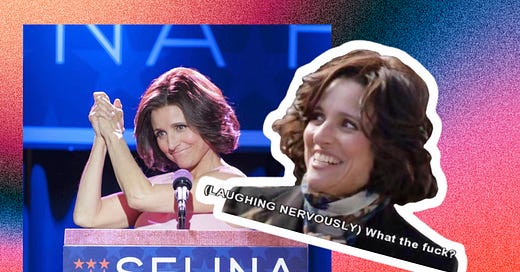



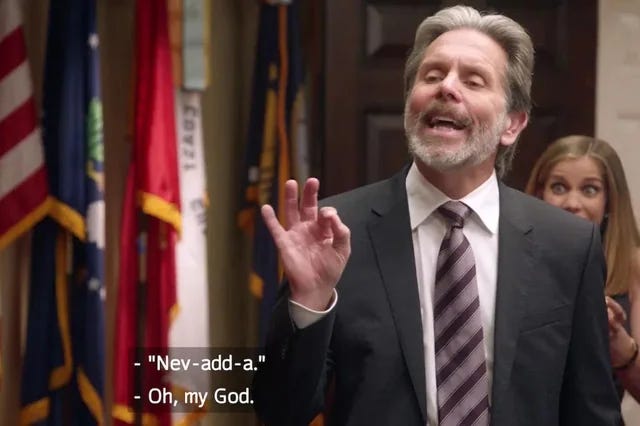

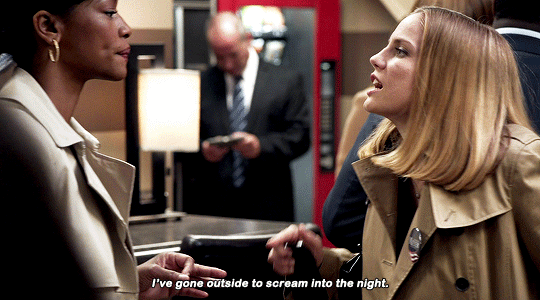
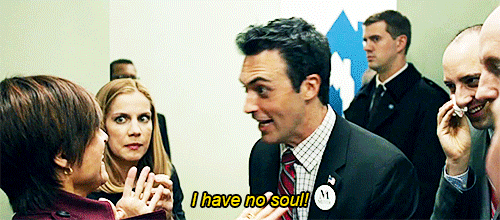
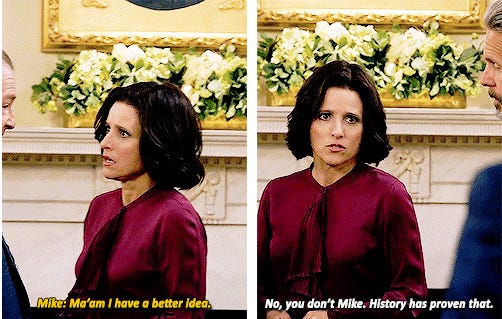

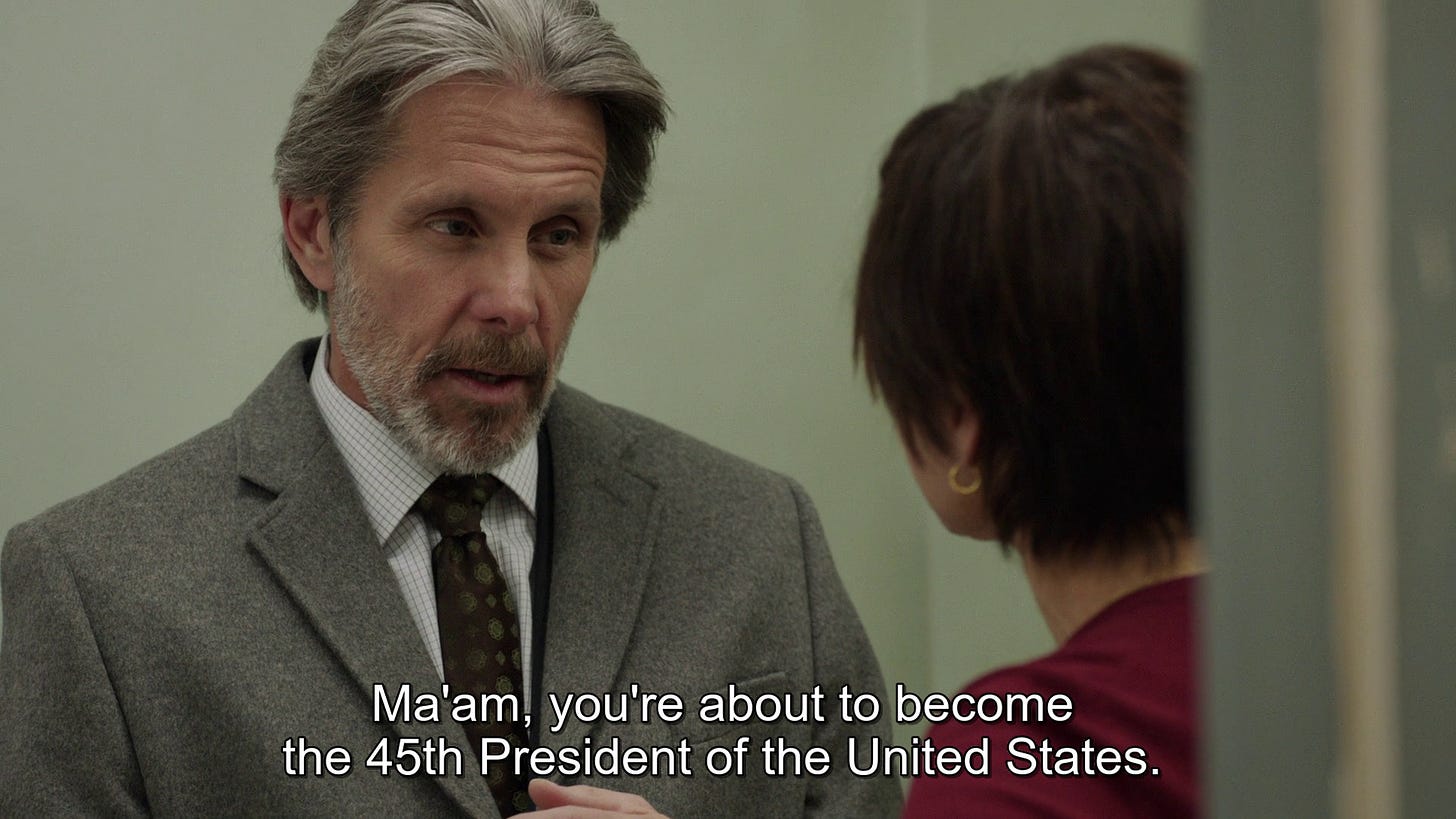
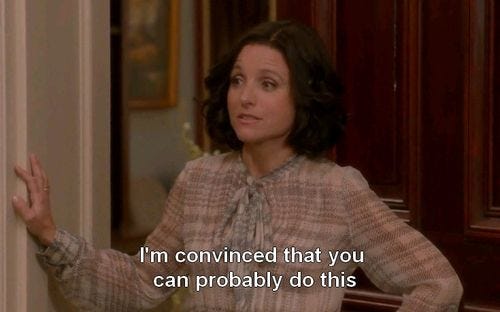
1. I love Veep. 2. This post is so bloody clever. I’m blown away with how you weaved in Veep themes with today’s crazy political climate. So nuanced. There are so many on point lines, I don’t know which one to restack. 3. I’m in Australia so the election feels far away. Also, I’m not informed, this educated me on the stakes. Keep writing!
Horrendous election results. Fantastic analogizing. Yours is the kind of writing I like best. Glad I subscribed.